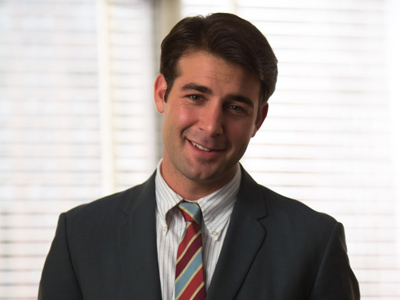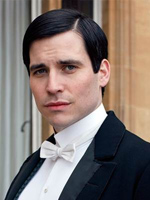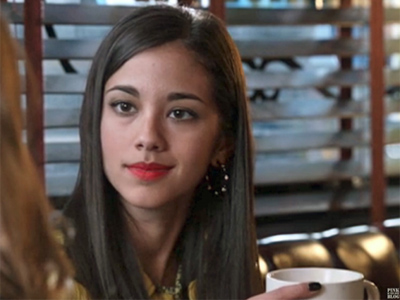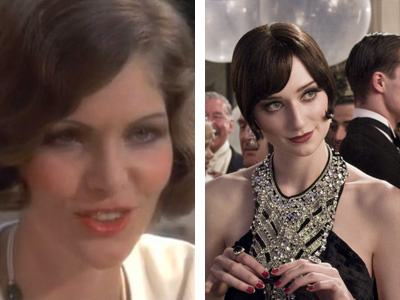Everyone is transfixed by the character of Bob Benson. We always knew his actions were not genuine. Who smiles that often? Who always buys two cups of coffee, simply to be generous? Who is always “on” like that? When Pete Campbell came in to Bob’s office and ordered him to stop smiling, and Bob finally dropped his smile, quickly, like turning off a light switch, it was a pretty delicious moment. We all wanted Bob Benson to be hiding something other than his homosexuality. But this representation of homosexuals as deceptive, not only about their homosexuality, but other details of their lives, maybe because of their sexual preference, is not new. It’s actually a trope we see often.

via Huffington Post
Let’s look at the character of Thomas on Downton Abbey. The character is dark and complicated. He isn’t supposed to be a source of amusement for the viewers, as some representations of gay men on television often are. He is a fully realized human being with flaws who happens to be gay. At least it would seem that way, until you realize that he also fits the classic stereotype of homosexuals as untrustworthy. Even his closest friends and conspirators can’t rely on him to keep his word. His nefarious actions are not portrayed as separate from his sexuality.

via Today
The actor who plays, him, James Collier, said part of his character flaws are tied back to his being part of an oppressed group. In an interview for Salon, he said, “He’s an outsider…It was really last year, I was thinking, ‘Well, why is he so angry?’ Everyone’s got a reason. And we don’t have back stories, we have to make our own up, and I think his is rooted in his sexuality.” It’s easy to say that Thomas is simply a bad guy because the world has abused him, and to a certain extent, it’s fair to say that being an outsider makes you a tad anti-social, but not necessarily downright cruel, which Thomas is. I hoped that Thomas could simply be a bastard because he is ruthless, opportunistic and cunning, not because he is gay.
When I first saw the Revenge character, Regina, Charlotte Grayson’s hard-partying friend, I wondered why she was so determined to befriend Charlotte. She was controlling of Charlotte’s time and tried to prevent her from speaking with her brother for even a few minutes. I thought she was part of the Initiative. I thought she may have been paid by some gossip rag that was determined to see Charlotte become the headline producing train wreck she was before.

via PinkIsTheNewBlog
I was surprised but disappointed by the real reason Regina was so interested in Charlotte: she was attracted to her. On one hand, it seemed positive that Revenge added a queer character in addition to bisexual Nolan Ross. On the other hand, the choice seemed lazy. On a show that prides itself on twists and turns, it seemed too straightforward. It was also yet another iteration of the nefarious and untrustworthy homosexual. The show’s rich representation of bisexual men through Nolan Ross almost excused this choice, but not entirely. She also has something in common with Bob Benson and Thomas in that they desperately pursue people they know to be (probably) straight.
Underneath the manipulation there is a desperation to be loved, which makes them out to be submissive individuals with low self-esteem. The straight characters react in disgust to their desperation. It is a bit of an insult to queer people, not to mention slightly homophobic, to suggest they are all attracted to straight people and will do anything to “turn” them. Isn’t it a little backwards to assume that these individuals don’t have enough confidence in themselves, not to mention self --awareness, to seek out queer partners? Thomas certainly has high barriers to meeting gay men, but Bob has an inner circle of gay friends and Regina lives in the greater New York City area in 2013.
The deceptive queer character has been around for a long time. There is no better example than The Great Gatsby’s Jordan Baker. F. Scott Fitzgerald takes every opportunity to present her as the fraud that she is:
“Jordan Baker instinctively avoided clever, shrewd men…because she felt safer on a plane where any divergence from a code would be thought impossible. She was incurably dishonest. She wasn’t able to endure being at a disadvantage, and given this unwillingness, I suppose she began dealing in subterfuges when she was very young in order to keep that cool insolent smile turned to the world and yet satisfy the demands of her hard, jaunty body.”
As the paper, “Jordan Baker, Gender Dissent and Homosexual Passing in The Great Gatsby” by Maggie Gordon Froehlich points out, Jordan Baker lies about everything because she is a closet homosexual. We know she is a lesbian because Fitzgerald uses all of the appropriate code words: jaunty, hard, muscular. We also know that she lied to Nick Carraway about leaving the top down in a borrowed car, for no discernible reason besides the fact that she is secretly queer and therefore lies about everything from the car to her first golf tournament.
It is important to note that our culture has carried these attitudes from 1920s literature to television shows made in 2013. For some reason it is hard for our culture to accept that closeted gay people could lie about their sexuality and tell the truth about other details in their professional lives or friendships. This conforms to suspicions straight people have always had of homosexuals, whether they are out of the closet or not. There is disbelief that someone could enjoy or prefer a sexual activity other than the widely accepted norm. That reluctance to understand breeds mistrust. That mistrust manifests itself in characters like these, whose homosexuality and deceptive nature are inextricably linked.


very interesting! the whole trope also seems to hinge on the idea that queer people who do not disclose their queerness are “lying”.
quite interesting and also quite a common portrayal of gays it seems. I hardly had to think for even a moment before coming up with another example – I watched the movie side effects a few days ago in which *spoiler alert* the lesbian ladies tried to pull off an elaborate conspiracy which also involved killing the one’s husband. (Granted the one with the husband was portrayed as not really a lesbian, but a psychopath who pursued the lesbian relationship for financial/satisfying-my-psychopathic-needs reasons.)
But might be worth mentioning that virtually every story (book/film/series) has a deceitful “bad guy”. is the percentage of gay characters that are portrayed as deceitful really higher than the number of straight deceitful characters?? idk
When 90% of the population and 98% of popular media is straight, I think it’s quite easy to say that this “deceptive homosexual” trope is not statistically equal to straight villains simply because of its overrepresentation.
I think the problem isn’t necessarily the ratio of deceitful gay characters to deceitful straight ones, but rather that a lot of the time the only gay character at all is the deceitful one, you know? And even then, it’s an issue with regards to the pattern and not necessarily the work itself– even if the authors don’t mean anything beyond “is evil, is also gay,” it can still have unfortunate implications.
“I think the problem isn’t necessarily the ratio of deceitful gay characters to deceitful straight ones, but rather that a lot of the time the only gay character at all is the deceitful one, you know?”
YES
“I think the problem isn’t necessarily the ratio of deceitful gay characters to deceitful straight ones, but rather that a lot of the time the only gay character at all is the deceitful one, you know?”
YES, you are completely right about this being the major issue.
I mean, if we’re talking about deceitful characters ratio, maybe Bob Benson isn’t quite as bad as some others, since Mad Men is, as I’ve argued a lot this season, a show FULL of assholes and as far as deceit goes, the heterosexual main character is also living a lie about his life – and the show made the parallels between the two clear. But the massive fan speculation about Bob Benson and the way he loomed so large in the show’s legend this season makes me feel like there’s more to it than that.
Confession: I don’t actually watch Mad Men! So I was just like nods yes sneaky gay character yes and just sort of assumed some shit. It’s weird because I keep hearing that the premise of the show is that the main character is lying about who he is and then I completely forget about that, only to be vaguely surprised when it comes up the next time.
But even in shows full of assholes, the fandom definitely reacts to queer characters differently! See: the “hilarity” that was Game of Thrones dudebros after they “turned Renly and Loras gay” no you guys just missed it because you took everything at face value without any critical thought, which is apparently only acceptable when it’s detailed plot analysis and not “silly fangirl things.”
ah, this is super interesting. i have one million feelings about bob benson and mad men in general, and part of me doesn’t actually think they are lazy enough to use these kinds of tropes because mad men is one of the few shows i watch where there is sooooo much going on under the surface that makes things far more interesting. but maybe we are both right. if you haven’t read tom and lorenzo’s summing up of all this bob benson fun, you definitely should.
also jordan baker as queer YES
I’m so wanting to give them the benefit of the doubt… roll on next season!
Tom and Lorenzo have been great on the Benson character. I was surprised and disappointed where they took Bob and Manolo; esp. since I’d just watched “Side Effects” earlier that afternoon (see above).
And I have loved The Great Gatsby for many years for these reasons and more. It’s a shallow read of the book to think it’s about crass materialism. It’s really about so many “misfits” (by the rigid standards of propriety that surround them) trying to pass, with generally poor results. Satisfying to have it brought up in the same breath as Mad Men.
Yeah I’m really hoping there’s more to Bob Benson than what we saw this season. We got left kind of hanging by that. Hoping that James Wolk’s tenure on another show won’t keep him from the show any more than Alison Brie has by being on Community.
I was just thinking about this last night after watching the season finale of Mad Men. I really hoped there could be a complicated and wonderful exploration of love between Bob and his apparent object of desire (no spoiler!) but now I’m really disappointed in how the series went with the lazy suspicious manipulative gay gloss. I expected more from them.
Statistically, yes, there are going to be some queermos who are less than lovely… none of them here though, right?! But this trope is a cliche precisely because it is often the only representation of alternative sexualities on TV/in film.
Am I right in thinking that Salvador and Joan’s roommate are the only other hints of gay characters in this series or am I forgetting someone important?? Oh, yes, the journalist, Peggy’s friend – she was at least a little redeeming. Oh Mad Men. I so wanted Bob to be so insufferably nice because he was, you know, actually nice and not just a slimy sneaky criminal with (apparently prerequisite) ‘perversions’!
Was Jordan Baker really coded as gay? How I did miss that reading the book? Granted, I haven’t read it since high school which was about 12 years ago.
I totally missed it too, both in my own reading and in all the commentary I read about it. And I’ve read it like 15 times, including in the past year. WTF lit crit!
Yeah, I’ve been wondering lately if The Great Gatsby is due for a re-read, since I haven’t read it since I was an oblivious, closeted 15-year-old assigned it for 10th grade American literature.
All the jokes I’ve made about Jordan Baker being a giant homo don’t seem so far-fetched anymore.
Jordan Baker and Nick were the beardiest beard couple that ever bearded. I was a little upset that they didn’t make that obvious enough in the Baz Luhrmann movie. In the book, there’s basically a sex scene between Nick and that photographer after the party at Myrtle and Tom’s apartment. And Jordan… I mean, golfing? C’mon, Jordan. I’m a golfer too. I see you.
Yes, and Nick was also clearly in love with Gatsby. You can tell just by reading the descriptions of him versus the descriptions of Jordan and Daisy.
The total lack of Jordan/Nick in the movie was really bewildering to me at the time, having never sussed out Jordan’s homo inclinations. But now it sort of makes sense! maybe I should go watch the movie again.
This reminds me so much of when I was reading Shakespeare’s Othello and my English teacher would not stop insinuating that Iago (the scheming bad guy) was gay. I appreciate having teachers willing to talk about sexuality at all, and consider different interpretations of a text.
The problem was that my teacher and classmates would attribute the root of his every flaw to living in the closet/his secret love of Othello/his isolation. Like the article, we didn’t discuss that Iago “could simply be a bastard because he is ruthless, opportunistic and cunning, [insert more fitting adjectives here] not because he is gay.”
That led to pretty shallow lit analysis, and some sad and confusing feelings on my part. Especially since the day my teacher mentioned this interpretation was the day I came out to my best friend (the first person I came out to).
This is so interesting and also a little discouraging. But I’ll stick with my number one feeling of Jordan Baker Lesbian and leave it at that.
Something I’ve been trying to suss out my feelings on for a few weeks now has been how the internet reacted to Bob Benson being gay, specifically the scene where he puts the moves on [SPOILER FOR YOUR POOR TASTE IN MEN, BOB]. I noticed that a LOT of people’s initial reaction was belief that he was faking it, or somehow using it to get ahead. How does this idea dovetail with the ~devious gays~ trope? The whole internet (save T&L) jumping to the conclusion that he must be lying about being queer as well really troubles me, but I’m having a hard time linking them together coherently. I’m still fuzzy from last night’s/this morning Wendy Davis bender.
“SPOILER FOR YOUR POOR TASTE IN MEN, BOB”
Seriously, though. He and Peggy both need a talking-to about LOOK AT YOUR LIFE, LOOK AT YOUR CHOICES with regard to their picks in men.
Fascinating! I’m glad you mentioned Jordan!
Yeah, I’ve been wanting to parse out my thoughts about Bob Benson, as a Mad Men obsessive, but this did it better than anything I’ve seen (as well as Thomas Barrow, since I’m a huge Downton Abbey, and while on the one hand he’s a fascinating character on the other hand I’m so sick of the “villainous gay” nonsense). People on Tumblr got kinda mad at me when I pointed out that Mad Men hasn’t done its gay characters right since Sal, since they’ve all been some sort of negative stereotype (either “predatory” gays creeping on the straight characters – which Bob could be seen as as well – or this weird deceptive nonsense).
*huge Downton Abbey fan as well
One of the things that I really liked about D.E.B.S. was that it touched on this in a non-negative way. [SPOILER] It’s revealed that the test used to recruit agents measures the candidate’s ability to lie, and the mostly-oblivious Narnian Amy gets a perfect score. Even before I had the faintest inkling that I was gay, I found myself telling lies about myself and my feelings because I could sense that there was something “wrong” about the truth, even if I didn’t know what it was.
In reaction to commenters who have said Don is also living a lie and that I should read Tom & Lorenzo, yes and yes. I read their takes after every episode. I simply think that their lies and the nature of their lying is portrayed differently. Now we have haven’t had much time to see Bob and his hidden life but so far, Bob is as i mentioned in the beginning, robotic. He turns his feelings on and off. Don lies and tries to cover his tracks but he can’t lie very well with his emotions, only his words. He always struggled with it, whereas Bob does it with great ease, i.e. dropping the smile I mentioned. I think that’s what bothers me.
Don’s lying was sympathetic because he seemed to hate doing it and Bob’s lying is so easy for him. Not to mention the consistent tendency of gay characters’ trying to hit on straight characters. I rarely see (in any television shows) a straight character trying to turn a character straight and doing so desperately, though I’m not saying there aren’t examples.
Which definitely comes down to a visibility issue. Bob can’t be portrayed better because he’s gay and the TBTB can’t give him more than 6-8 minutes per episode. Which is what I think you were trying to point out? They show his “deceit” (which the heteros have already forgotten the reason for – I guess we’re post queer as well as post racial now) without showing the terrors of being gay at that time & in his place; the fact that for a poor kid from West Virginia it could have meant poverty and/or death.
Bob could have used a couple of Dick Whitman flashbacks this season. Of course I can keep dreaming on that one.
I never took from the portrayal of Bob that lying was “easy” for him, but the majority of the target audience thinks so. Which makes it a problem.